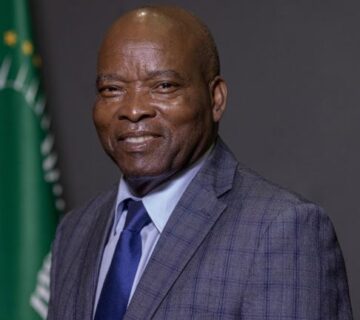By Rim Ben Khlifa – Tunisia
Climate anxiety is an affective reality that has grown stronger in the last several years as climate change impacts become more visible and severe everywhere across the globe.
With devastating floods and raging wildfires, rising sea levels and perpetual droughts, the planet is sending out distress signals. For many, this creates a deep feeling of terror, uncertainty, and grief for the future. Women report higher levels of climate anxiety across the diverse populations examined.
This pattern is shaped by psychological and social factors, and an understanding of it is key to formulating successful responses to the climate crisis.
Climate anxiety is often misunderstood or dismissed as irrational worry, but it is, in fact, a logical and valid response to the existential threat posed by environmental degradation. It is not simply about being afraid of the unknown, but about mourning what is already lost, feeling powerless against systemic failures, and fearing the risks to personal and collective survival.
For many, especially those living in regions most vulnerable to climate change, anxiety arises from daily experiences of crop failures, water shortages, displacement, and health risks that make the crisis deeply tangible. In addition to direct exposure, knowledge and empathy about global suffering also fuel this anxiety, particularly among those who care profoundly about justice and equity.
Women are more likely to suffer from climate anxiety than men. Women are more emotionally sensitive and more inclined to express vulnerability and concern psychologically. Sociologically, women mostly work as caregivers, nurturers, and organisers in their communities, which means that others are children, elders, and neighbours in their daily job.
These positions compound the emotional intensity of environmental risk, since women are not only worried for themselves but also for the futures of those for whom they have caring responsibilities. Women are also commonly at the lead in environmental impacts, especially in the Global South, where limited access to resources and services heightens the burden of coping with climate shocks.
In Africa, the continent that faces some of the harshest climate realities, women’s climate anxiety is intimately tied to lived experience. In the Sahel region, for example, communities have endured repeated droughts that reduce water availability and force pastoralists and farmers to adapt or move. Women in these areas often bear the brunt of these changes, as they are responsible for gathering water, growing food, and maintaining household health. In Burkina Faso and Niger, many women describe anxiety linked to the unpredictability of the rains and the loss of fertile land, which threatens not only their income but their ability to feed their families. This stress is compounded by social inequalities and limited access to decision-making power, which can make solutions seem out of reach.
Similarly, in East Africa, countries like Kenya and Ethiopia have faced recurring droughts and land degradation, severely affecting rural women’s livelihoods. In many communities, women walk miles daily to collect water, a task that becomes more arduous as water sources dry up or become contaminated. This physical burden is coupled with emotional strain: the fear of failing to provide for their children, the worry about future generations’ prospects, and the frustration of seeing their lands deteriorate despite years of stewardship. Some women report feelings of despair and hopelessness, which mirror broader community anxieties about displacement and food security.
Despite the heavy emotional toll, African women have been pivotal agents of resilience and change. Across the continent, women-led initiatives show how climate anxiety can be transformed into meaningful action. In Senegal, for example, women farmers in the Casamance region have adopted agroforestry techniques that combine tree planting with crop cultivation, helping restore soil fertility and create microclimates that mitigate heat and drought effects. These women often organise themselves into cooperatives, sharing knowledge and resources, building collective strength, and advocating for their rights and needs. Such grassroots efforts demonstrate how emotional concern can fuel empowerment.
In Ghana, women’s groups have pioneered the use of solar-powered irrigation systems, allowing small-scale farmers to irrigate their fields sustainably despite erratic rainfall. This innovation not only improves food security but also frees women from the exhausting and time-consuming task of manual watering. By embracing renewable energy technologies, these women highlight how climate anxiety can push communities toward sustainable development and innovation.
Nigeria offers another powerful example, particularly in the Niger Delta region, where oil pollution has devastated ecosystems and local livelihoods. Women activists have been at the forefront of demanding corporate accountability and environmental justice, organising protests, engaging with international organisations, and educating their communities about the link between environmental degradation and health problems. Their activism is deeply motivated by a sense of responsibility to protect their families and communities from further harm.
This intersection of environmental and social justice issues resonates strongly with many African women who experience the effects of climate change as inseparable from issues of inequality and marginalisation.
Women’s climate anxiety also inspires leadership at the policy level. Across Africa, female politicians, scientists, and advocates are increasingly vocal about integrating gender perspectives into climate strategies. For instance, the African Women Leaders Network on Climate Change promotes the inclusion of women’s voices in national and regional climate policies, arguing that effective solutions must address the gendered nature of vulnerability. By bringing lived experiences into the policy arena, these women help ensure that climate actions do not overlook the needs of the most affected.
The transformative potential of climate anxiety lies in its capacity to motivate persistent and collective action. Women who feel deeply about the environment tend to be among the most dedicated changemakers organising community clean-ups, leading reforestation projects, educating youth, and influencing cultural norms around consumption and waste. Their actions, while sometimes underrecognized, generate ripples that influence families, neighbourhoods, and even entire regions.
At the same time, it is crucial to acknowledge that climate anxiety can become overwhelming and damaging if left unaddressed. The emotional burden of witnessing environmental destruction and facing an uncertain future can lead to stress, depression, and a sense of helplessness. For women, who often carry both their own worries and those of their communities, the risk of burnout is high. Mental health support must therefore be integrated into climate responses, through counselling services, community dialogue spaces, traditional healing practices, and peer support groups.
Recognising and validating climate anxiety as a natural response helps individuals build resilience and sustain their engagement.
Innovative approaches to mental well-being are emerging across Africa. In Uganda, for example, eco-therapy programs combine nature walks, storytelling, and mindfulness techniques to help participants process their emotions about environmental loss.
Similarly, in South Africa, community healing circles offer safe spaces for women to share their experiences of climate stress and to strengthen social bonds. These culturally sensitive methods demonstrate how emotional care can complement environmental activism.
Hope remains a vital and powerful force in the face of climate anxiety. It is not a naive or passive optimism, but a determined commitment to continue striving for a livable future despite daunting challenges.
Women’s heightened emotional response to climate change reflects a profound care for life itself, their families, communities, and the natural world. This care fuels both their fear and their courage, motivating them to protect and restore the environment.
To feel scared of the climate, in itself, is a sign of being awake and alive. When the fear is acknowledged and channelled, it becomes a creative force, an instigator of action, leadership, and innovation. African women, by their resilience and agency, are already teaching the world how to shift away from hopelessness to hope, from grieving to growth, and from fear to fierce nurturing of the earth. Their stories are a reminder that emotional engagement with climate change is not merely personal struggle; it is about our collective responsibility and transformational capability. Out of their suffering and out of their resilience, one of the most hopeful paths for humankind can be discovered.





No comment